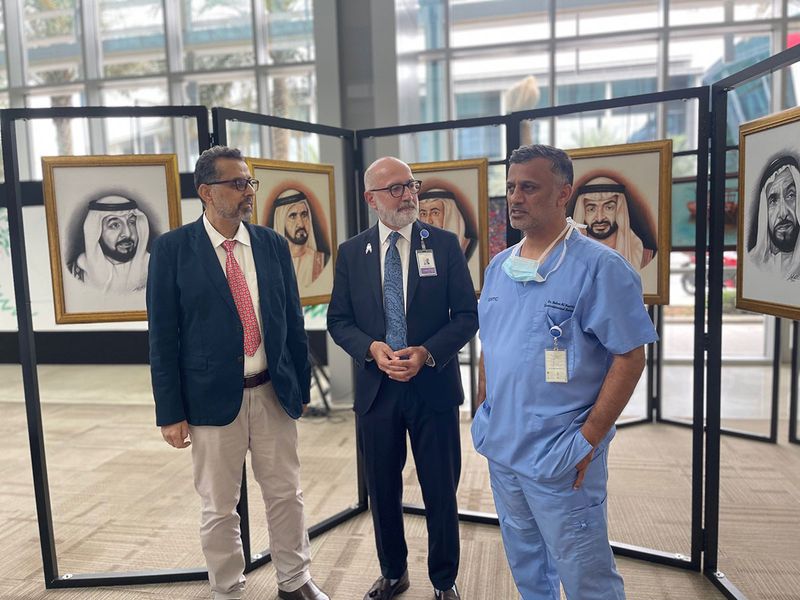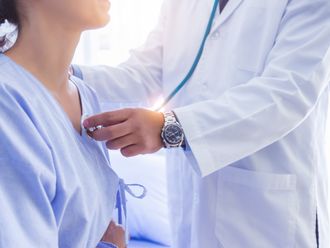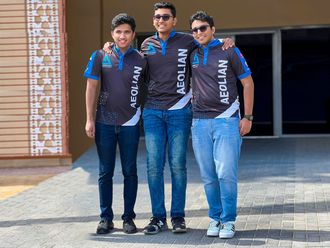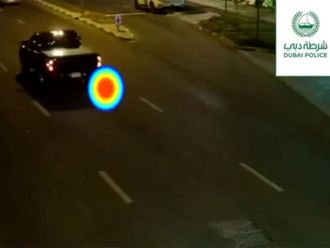
Abu Dhabi: An Abu Dhabi-based artist who has been living with colorectal cancer for more than six years is creating awareness about the disease through a new exhibit in the capital.
Ayman Awwad, a Jordanian expat, inaugurated his new exhibition, which is being hosted at the Sheikh Shakhbout Medical City (SSMC) in the capital.
“Art has helped me a lot during this difficult journey. It has healed my sadness, and brought out my positivity and love for life, which keeps me going. Art truly has the power to make people experience life beyond their illness. I wish is for people living with serious diseases or cancer to find ways to enjoy life,” Awwad said.

“I discovered my passion for art in Grade 8 in school, when I drew for the first-time sketches for my art class. My teacher, who took a keen interest in my drawings and nurtured my skills, inspired me to take up art as a career. It was a turning point in my life,” he added.
Awwad was diagnosed with colorectal cancer in 2017, and has since undergone multiple procedures and treatments. His new exhibition, which features landsape paintings, abstract art, and portraits is open till March 24, and coincides with Colorectal Cancer Awareness Month, which is observed globally in March.
Common male cancer
Colorectal cancer typically starts as a benign polyp – a soft tissue growth – that develops on the colon or rectum’s lining; this an develop slowly over time to become cancerous. Colorectal cancer is the most common cancer among men in the UAE. Early detection vastly improves treatment outcome, and increases the chance of a cure, which is why routine screenings are essential.
The SSMC has therefore launched its colorectal cancer campaign, urging residents aged 40 and older to undergo regular screenings, and therefore the chances of early detection. The hospital is also hosting a series of community talks during March to drive greater awareness among residents about the disease, and to emphasise the need for regular screening.
read more
- Watch: 17-year-old Dubai boy on a mission after beating testicular cancer
- World Cancer Day: How a Sharjah girl, 11, overcame an elusive cancer
- 'How I journeyed through cancer, from misery to hope'
- UAE: 'Sharjah Declaration 3.0' aims to eliminate cervical cancer in the region
- Artificial DNA: How they help destroy cancerous tumours through ‘cell death’
Advanced detection tools
“Colorectal cancer often does not show symptoms in its early stage. When symptoms show, people often ignore them due to fear of discovering a serious disease. At SSMC, improving the health and well-being of our community is an absolute priority. Our multidisciplinary team works cohesively to shed light on the importance of screenings and how preventable colorectal cancer can be,” said Dr Michael Wallace, chair of the gastroenterology division at SSMC.
Since its introduction in April 2022, SSMC has screened over 300 cases using the GI Genuis module, an AI-powered tool that eases detection and removal of pre-cancerous polyps during colonoscopies.
“SSMC serves to elevate the provision of health care services in the country under the Abu Dhabi Economic Vision 2030. Our teams of experts are fully dedicated to safeguarding the community’s health through ongoing health literacy efforts that focus on preventive medicine and the application of innovative approaches and techniques. As we work tirelessly towards becoming a destination medical center, we remain committed to integrating sustainability in every step of our operations and providing the highest levels of integrated and compassionate care to our patients,” said Dr Abdulqader Almessabi, deputy chief medical officer and consultant for SSMC’s division of gastroenterology and hepatology.
SSMC is the designated lead for cancer services within the Abu Dhabi Health Services Company (Seha) network in Abu Dhabi.
Female patients
In order to ease their primary concerns, the hospital even provides female patients with access to a women-led team of experts for colorectal cancer screening and treatment, including female gastroenterologists, pathologists, radiologists, oncologists, and specialised nurses.












